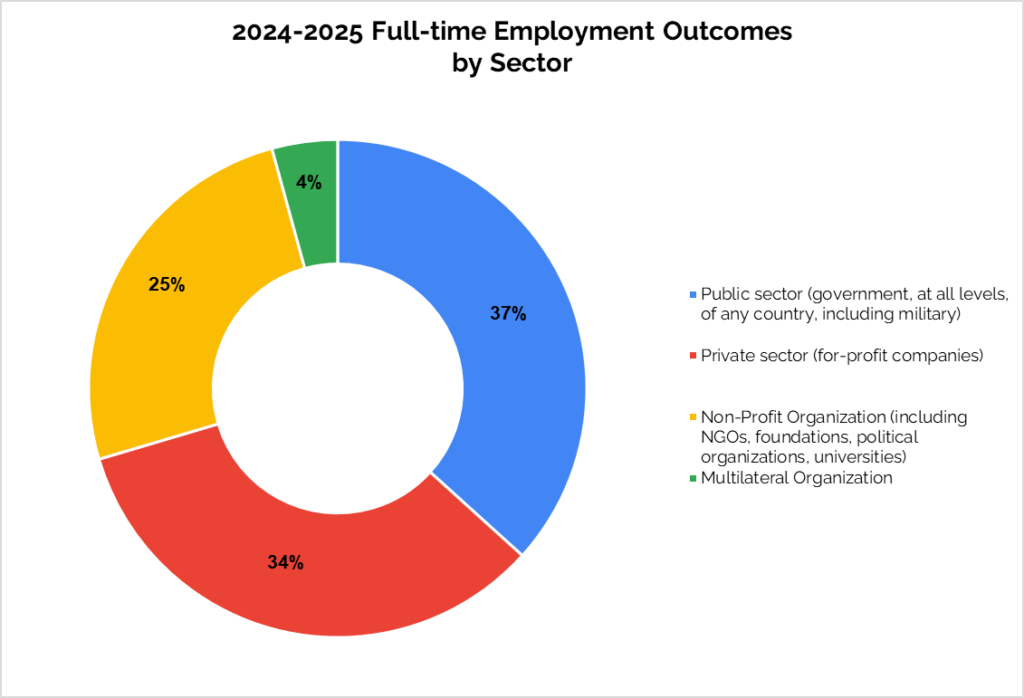Best Practices in Applying


Best Practices in Applying
- +Investigate Your Professional Options
Professional degrees should be grounded in your professional goals. Research job opportunities that seem interesting, even if you’re not yet qualified. See what skills and competencies they require. Ask supervisors, professors, peers, family members, and others for insights.
- +Determine What Programs Fit Your Needs
Read websites to understand the structure and emphasis of different degree programs. Ask yourself: What will you study in one program compared to another? Are you qualified? Will this degree build the skills, competencies, and network you need to achieve your professional goals? These personal reflections will help you sift through different options and prioritize. Keep an open mind. Programs that you might not have heard of could be the right fit for you.
- +Talk to Schools
Connect directly with admissions counselors during an APSIA or School-sponsored event, such as an APSIA Recruitment Fair. Go beyond what you read on a website. Get personal answers to your specific questions. During your conversations, remember to: show direction, convey your interests, and express any concerns.
- +Complete Prerequisites; Work on Weaknesses
If you know that aspects of your application may need improvement, work on those weaknesses first. Take any required standardized tests early, so that you can retake them if necessary. If a program requires specific strengths, which are not your natural strengths (such as writing or quantitative analysis), find ways to improve them through online courses or simple practice. These efforts show Schools you are serious about being competitive for their program.
- +Work on Financial Aid and Applications Simultaneously
Applications for financial assistance cannot wait until you have been accepted into a graduate program. Research financial aid at the same time you research degree programs. Prepare your materials at the same time. Be conscious of financial aid deadlines, which are often distinct from application deadlines. When you speak with admissions counselors, ask about the financial assistance they provide. Build relationships with Schools in case you need to ask for extra help.
Frequently Asked Questions
- +How should I prepare to apply?
- Research graduate schools (attend fairs and information sessions, read websites, speak with faculty). Complete prerequisite courses and skills. Identify weaknesses in your application and find a way to make up for it. Begin to compile application materials (request transcripts, register for standardized tests, identify references).
- +What application materials are typically needed?
- Most schools will ask for an application form, letters of recommendation, essays, transcripts, standardized test scores, and a resume. However, be sure to read the specific details from each school to confirm their exact requirements.
- +Who writes an effective letter of recommendation?
- Most schools want a mix of academic and professional references. Ask people who know you and your work well, who are willing to write a good letter for you, and who are reliable. Do not ask family and/or friends!
- +What should my essays and personal statements be about?
- Read the essay question and answer it clearly and completely. For a personal statement, share your story in your own words and address:
- What do you want to study and why?
- What is your experience in that field?
- What you plan to do with your degree once you have it?
- Why now (timing of your application)?
- How does this program fits your goals?
- +What financial aid is available?
- Schools, universities, the government, private foundations, financial institutions, community groups, and other sources provide aid. Individual aid packages will vary based on merit and need. When determining your financial need, don’t forget to consider ALL the costs of attendance (tuition and living expenses).
- +What kinds of programs are available?
- APSIA schools offer a range of programs in
- Comparative and Regional Studies
- Energy and the Environment
- Foreign Policy and Diplomacy
- Health Policy
- Human Rights and Social Justice
- International Law
- Peace and Conflict Resolution
- Political Economy
- Public and Intercultural Communication
- Social Enterprise Development
- Science and Technology
- Security Studies
- Sustainable Development
- Trade and Finance
- Other Areas!
- +What do people do with APSIA degrees?
- APSIA graduates excel in the public, private, and non-governmental sectors. On average 37% of APSIA graduates go into the public sector, 34% are employed in the private sector, 25% work in the non-governmental sector, and 4% work for multilateral organizations. APSIA graduates run businesses, work for peace, expand trade, counsel governments, and much more. Learn more about career options in our online guide.
- +How do I know which school is right for me?
- When choosing a graduate program, take a range of factors into account, such as the core requirements of a program, expertise of the faculty, access to student services and an alumni network, opportunities for professional development, cost, location, and program size.
- +How can I tell which APSIA school will be a good fit?
- Ask yourself these five questions:
- What will you study when you are there? Understand whether a program is structured or flexible. See which approach best meets your needs and preferences.
- Are You Qualified? Understand where you fit within the average student qualifications posted by the School.
- Do you Like Being There? Understand the environment around the School. Determine if you like where you would live for the next two years.
- Can you Afford It? Understand the full costs for the entire program, including internships and study abroad. Many schools post estimated student expenses and describe financial aid opportunities on their websites.
- Does it Fit with Your Professional Goals? Understand whether the skills and competencies you will build in the program connect with what desirable employers are looking for now and in the future.
- +What are the employment statistics of APSIA member graduates?
-
